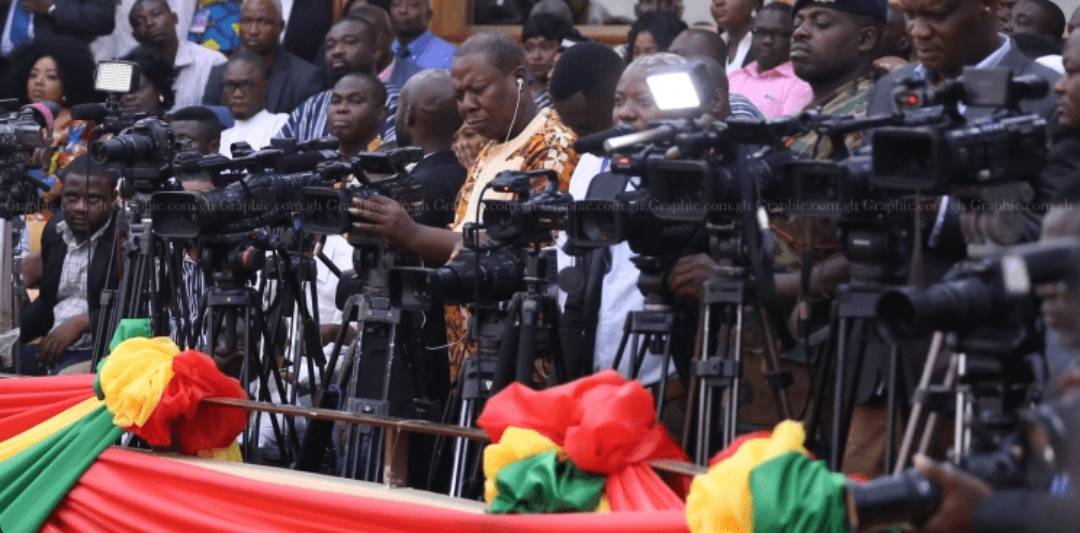The Chairperson of Ghana’s Electoral Commission (EC), Jean Mensa, has taken a bold step to ensure transparency and build public confidence in the ongoing elections. In a press briefing held on December 7, Mensa announced that the media would be given unrestricted access to all collation centers nationwide. This decision aims to promote credibility and accuracy in election reporting, allowing journalists to keep the public informed in real-time.
Speaking from the EC headquarters in Accra, Mensa underscored the critical role the media plays in elections. She expressed the Commission’s commitment to working closely with journalists to ensure free, fair, and transparent elections. By opening collation centers to reporters, the EC seeks to demonstrate that there is nothing to hide during the crucial vote-counting phase.
According to Mensa, the media’s presence at these centers will enhance transparency and accountability, giving the public confidence in the entire electoral process. She also called on journalists to act professionally and responsibly, ensuring their reports are factual and verified before publication.
“We are granting the media access to all collation centers nationwide,†she said. “This will enable you to report firsthand on the collation of results, helping the public stay informed about the process as it unfolds.â€
Mensa emphasized that the integrity of Ghana’s elections depends not only on the efforts of the Electoral Commission but also on how the media covers and communicates the process to the public. She urged reporters to avoid sensationalism and to cross-check information with the EC before publishing any news.
To make things easier for journalists, the EC has established a toll-free number, 0800324324, to provide prompt clarifications or address any challenges encountered during the election. This hotline will ensure that any issues are resolved quickly, minimizing the risk of spreading misinformation.
The EC Chairperson also highlighted how journalists play a key role in educating the public about the electoral process. By accurately reporting on events, the media can help foster trust in the system and prevent unnecessary tensions or confusion among voters.
Mensa’s announcement has been met with enthusiasm from journalists across the country. Many media professionals see this move as a positive step toward promoting transparency and holding the EC accountable for the results. Reporters believe that unrestricted access to collation centers will enable them to provide timely updates and debunk any rumors or false claims that may arise during the elections.
For voters, this decision is a reassuring sign that their voices will be heard and their votes will be counted fairly. Allowing the media to observe the vote-counting process in real-time ensures that no irregularities are hidden from public view.
Beyond granting access to collation centers, Mensa reminded journalists to handle their responsibilities with care. She warned against sensational headlines or unverified reports that could undermine public confidence in the election process. Instead, she encouraged reporters to prioritize accuracy and objectivity in their coverage.
“The trust people place in our elections partly depends on how the media tells the story,†Mensa said. “I appeal to you to ensure your reports are balanced, factual, and verified. Together, we can maintain the peace and stability of our nation.â€
This move by the Electoral Commission is yet another example of Ghana’s dedication to strengthening its democratic principles. Over the years, the country has built a strong reputation as a leader in democracy in Africa, and this year’s elections aim to further cement that status.
In various parts of the country, voting has been proceeding smoothly, with Ghanaians showing up in large numbers to cast their ballots. Many citizens have expressed their confidence in the process, noting the improved measures put in place to ensure a free and fair election.
Journalists, too, are optimistic about the impact of this new policy. Several media houses have already deployed their teams to cover events at collation centers, vowing to deliver accurate and timely updates to the public. They believe that their presence at these centers will not only keep voters informed but also deter any attempts to tamper with the results.
As votes continue to be counted, the spotlight is on the Electoral Commission to deliver credible outcomes. With the media closely monitoring the process, there is hope that this year’s elections will set a new standard for transparency and accountability in Ghana.
Jean Mensa’s bold decision to grant the media full access to collation centers is a clear message to Ghanaians and the world: the Electoral Commission is committed to upholding the integrity of the electoral process. This collaborative approach with the media could serve as a model for other nations striving to build trust and transparency in their elections.
In the days to come, all eyes will be on the EC and the media as they work together to ensure a successful and transparent conclusion to the elections. For now, the public can take comfort in knowing that their votes are being carefully watched and accurately counted, thanks to the dedication of both the Electoral Commission and the journalists covering the process.




No comments yet
Be the first to share your thoughts!